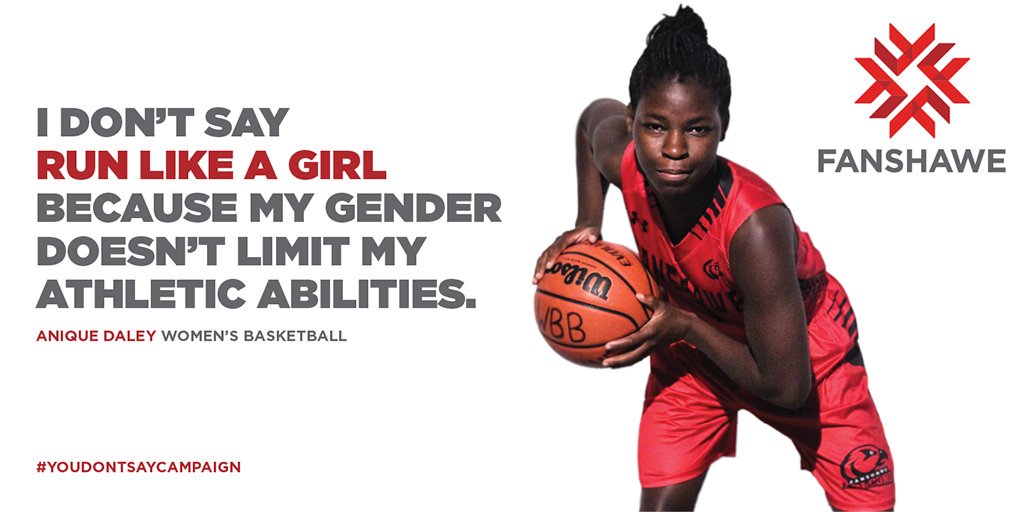Students pleased with the "You Don't Say" campaign
 CREDIT: PHOTOS BY KERRA SEAY AND SIMON DUNFORD; DESIGNED BY SIMON DUNFORD
CREDIT: PHOTOS BY KERRA SEAY AND SIMON DUNFORD; DESIGNED BY SIMON DUNFORDStudent leaders stand up and let fellow students know what they don't say in a campaign to try and change the negative discourse happening on campus.
Fanshawe’s “You Don’t Say” campaign is receiving positive feedback from students. Since October 2016, posters of student leaders have been displayed across the campus, with captions explaining why they don’t say certain expressions such as “That’s so gay”, “Run like a girl” and “They asked for it”.
First year fine art foundation student Rachel Heide supports the campaign because it makes “people aware of what other people may find offensive.”
Amanda Way, a second year business- finance student, said she didn’t know about the campaign until asked about it, but said the message behind it is important.
“Everyone’s perspective and what they’ve been through is all different, so you have to be aware of how it might affect them,” Way said.
First year police foundations student Matthew Crump also said he wasn’t familiar with the campaign, but also liked its message.
“It’s very good because you walk around the hallways and you hear everyone saying all sorts of things, not really thinking about if it could actually offend someone, which a lot of the time, it really could.”
Sebastian Francis, a first year police foundations student hopes “more people can get involved” in the campaign.
What those involved in the “You Don’t Say” campaign have heard
Leah Marshall, the sexual violence prevention advisor, said there would be a second edition of the “You Don’t Say” campaign for the winter semester, following the positive response from the fall semester. She said students came up to her during an awareness initiative at the Halloween pub and told her it was “the first time they had seen a campaign so directly take on some of the language”. She also said that the directness of the campaign and student involvement appealed to students.
Marshall explained that Fanshawe’s “You Don’t Say” campaign stemmed from the campaign of the same name at Duke University, located in Durham, North Carolina, where student athletes participated.
She and Jennifer Gillespie, the campus life facilitator at Fanshawe, contacted Duke for permission to replicate the campaign and tailor it towards the students at Fanshawe. The Fanshawe Student Union (FSU) executives, FanshaweOnline (FOL) advisors, residence advisors, athletes and representatives from the First Nations Centre are all involved.
“We wanted to connect with all different leaders across campus,” Marshall said. “We know there [are] many different leaders in different areas.”
Carlie Forsythe, the FSU president said that the participating student leaders, such as herself, picked messages that they “personally believe in” before having their photo taken for the posters.
She added that the campaign was featured in a MacLean’s magazine article about Fanshawe’s sexual violence prevention and awareness initiatives. She added that people from other colleges, such as St. Clair College told her that they liked the idea.
“It got shared quite a bit, which is actually pretty cool,” she said.
Falcons women’s basketball player Anique Daley is in her first year of the personal support worker (PSW) program and her fourth year at the college. She can be seen on some posters, and said she’s received positive feedback for participating.
“My friends have come up to me and say to me, ‘Hi. I saw your poster. It’s a good campaign you guys have going on’,” she said.
Beyond the posters: Why it’s important to remember the campaign’s message
Marshall said the campaign’s message will help create a safer environment for all students.
“Part of that is challenging problematic and oppressive messaging,” she said. “It’s not going to be one student leader. It’s not going to be a person in one position that’s going to change that culture. It’s going to be all of us coming together from each corner of the campus and saying that we want this to be a safer space for all students and we all have a role to play in changing that culture.”
Forsythe added that keeping the message in mind will help reduce stigma, including “certain areas of sexual violence, such as sexual violence against men”.
She added that students can live by the message by talking about it and educating themselves on why it’s important to watch what you say.
“That goes with anything in this world,” Forsythe said. “If you don’t understand something, don’t be afraid of it. Just educate yourself.”
FSU VP Internal Affairs Kevin Kaisar said students should live by the campaign’s message.
“I’m reminded of a story where some classmates of mine used the term ‘that’s so gay’ the one time, and I didn’t say anything about it because I didn’t want to be ‘that guy’ or the ‘social justice warrior’ and today I keep thinking, ‘Oh, I should have said something! What if they are still using that phrase?’” he said.
“I would say that this campaign taught me to call myself out when I do or say something that might be considered offensive, but it also made me feel more confident to tell others too, so for me it became ‘I don’t say... and I don’t think you should either.’”














